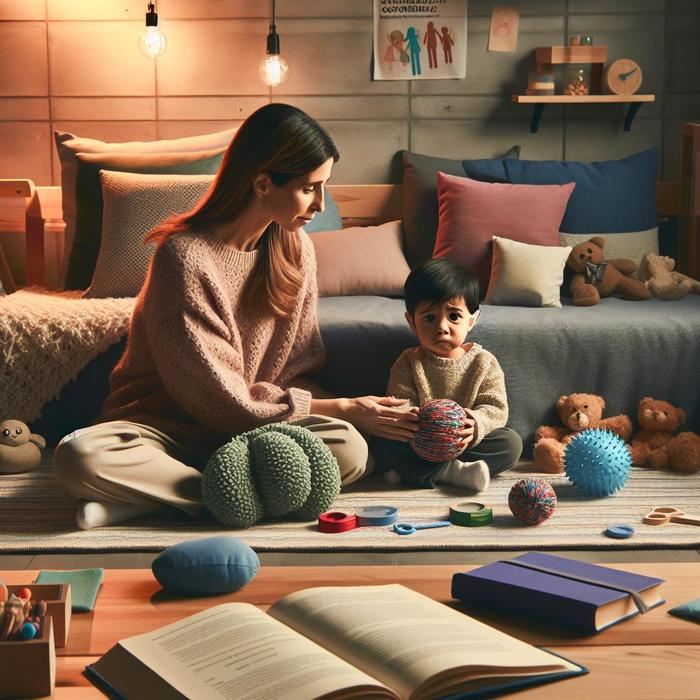Understanding the Basics of Managing Toddler Anxiety
Separation anxiety is a common stage of development for many toddlers. It can be a challenging time, both for the child and the parents. However, with patience, understanding, and the appropriate calming techniques, this period of anxiety can be managed effectively.
Firstly, let’s understand what separation anxiety is. According to Parents.com, it is a fear or worry that develops in a child when they are separated from their primary caregivers, commonly between the ages of 1 and 3.
What Causes Separation Anxiety in Toddlers?
The roots of separation anxiety lie in a toddler’s developing cognitive abilities. As your baby becomes a toddler, their understanding of the concept of ‘object permanence’ – the idea that people and things continue to exist even when not seen – becomes more robust. However, along with this understanding comes the realization that their parents can leave, triggering anxiety.
Identifying Signs of Anxiety
The signs of separation anxiety in toddlers may vary but generally include:
– Increased clinginess
– Crying or tantrums when separated
– Difficulty sleeping alone
– Fear of being alone
– Repeatedly seeking the comfort of familiar adults
If your toddler exhibits any of these, they might be experiencing separation anxiety.
Calming Techniques for Easing Separation Anxiety
Thankfully, you can take steps to help your child cope with this emotional rollercoaster. Our personal experience was backed by expert advice from Healthy Children and NHS:
Consistent Routine
Implementing a regular routine can bring a sense of security to your toddler. It helps them understand what to expect and prepares them for any upcoming separation, thus reducing anxiety.
Reassurance
Reassuring your child that you will return can provide comfort and ease their fears. Let them know when you will be back and stick to your word.
Slow Transition
Gradually introducing your child to new people and environments can build their confidence and make separations less daunting.
Comfort Object
Providing a familiar object, like a blankie or a favorite toy, can offer solace and a sense of security when you are away.
Models of Composure
Displaying calmness and confidence during separations can encourage your toddler to emulate these behaviors.
Remember, it’s vital to practice patience as your toddler navigates this challenging phase. For more tips on handling toddler emotion swings, check out our previous blog post.
Building Confidence in Your Toddler
Building confidence in your child is also crucial in managing toddler anxiety. When it comes to choosing safe gear for your toddler, consider our top picks and brands we trust. It can make a huge difference in their progress and development.
Why is Confidence Crucial?
Fostering a sense of self-assuredness in your toddler can help them:
– Feel secure in their environment
– Be more independent
– Develop resilience and problem-solving skills
How Can You Boost Confidence?
Here are some strategies:
– Praise their efforts, not just achievements
– Encourage independence in small tasks
– Provide opportunities for decision making
– Show unconditional love and support
Hidden HTML-formatted Meta Title and Description
Remember, each child is unique, and the duration and intensity of separation anxiety can vary. Over time, with love, patience, and consistent techniques, your toddler will outgrow this phase, and separation will become easier for both of you.
Finding Professional Guidance
Sometimes when parents attempt to handle the situation, they might find themselves overwhelmed and unsure of the next steps to take. In these cases, it can be beneficial to consider seeking professional guidance. Experts like pediatricians, child psychologists, or therapists can help provide you with invaluable advice tailored to your unique situation.
One such example is Boston Children’s Hospital. Here, you can find an array of resources and tools to assist you in understanding and improving your child’s anxiety situation. Similarly, UNICEF also provides relevant information to provide clarity on the subject and practical tips to manage this condition.
Other Helpful Resources to Consider
While personal advice from experts can aid a great deal, a broader understanding can come from exploring other resources. Websites like Taking Cara Babies and What To Expect offer excellent advice for parents who are facing these challenges.
Online Communities
There are various online communities and forums where parents can share personal experiences and delve into discussions about their children’s separation anxiety. Receiving support and hearing stories from parents who have gone through the same challenges can be very comforting.
Webinars and Online Counseling
Online counseling or webinars provide an avenue for parents to gain an in-depth understanding of their child’s anxiety issues. They also equip parents with effective techniques to manage and alleviate their child’s anxiety symptoms.
Online Tools and Apps
Given the advancement in technology, several online tools and applications have been developed to support the mental health of individuals. Software like meditation apps and cognitive behavioral therapy tools can be beneficial.
Wrapping things up
Separation anxiety can indubitably be a challenging experience for both the toddler and parents. But by understanding the cause, recognizing the signs early, and using calming techniques, it is undeniably manageable. Most importantly, remember to be patient and empathetic.
Trying your best to reassure your toddler that difficult feelings are temporary and overcome, that things do get better, will go a long way. As difficult as the separation anxiety phase can be, it is indeed a phase. With the appropriate management, your toddler will eventually outgrow it, opening the door to the next phase of their life – a confident, independent, and resilient individual.
Hidden HTML-formatted Meta Title and Description

